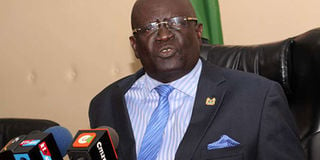Don't set up more campuses, Magoha tells universities

Education Cabinet Secretary George Magoha. He has told universities to stop establishing satellite campuses. PHOTO | FILE | NATION MEDIA GROUP
What you need to know:
- Prof Magoha said it does not make sense for a university to set up campuses even in areas where established universities exist.
- Moi University has announced its intention to shut down two satellite campuses in Kitale and at Odera Akango due to lack of students.
- CUE has directed Jomo Kenyatta University of Agriculture and Technology to close down its Kakamega and Eldoret campuses over quality issues.
Education Cabinet Secretary Prof George Magoha on Monday asked universities to stop setting up of more satellite campuses across the country. Prof Magoha said it does not make sense for a university to set up campuses all over the country even in areas where established universities exist.
SATELLITE CAMPUSES
The Education CS made the remarks in Nairobi when he opened a one-week conference on university education that has been organised by the government and the World Bank.
Moi University has announced its intention to shut down two satellite campuses in Kitale and at Odera Akango due to lack of students.
The Commission for University Education (CUE) has directed Jomo Kenyatta University of Agriculture and Technology to close down its Kakamega and Eldoret campuses over quality issues.
Since 2016, a total of 24 satellite campuses have been closed over quality issues.
OFFER SOLUTIONS
Prof Magoha asked vice-chancellors to stop focusing on enrolling more learners instead of putting more emphasis on the quality of graduates they produce.
He also asked university to offer solutions to some of challenges facing regions where they are domiciled through research.
“We have many programmes in universities that need to be merged,” said the CS.
The conference, which ends on Friday, has attracted participants from Benin, Tanzania, Malawi, Somalia, Sudan and Mozambique.
The theme of the conference is ‘improving higher education performance.’ The conference comes in the wake of sustained efforts by the government to reform the ailing university education sector.
GROWING POPULATION
The government has announced plans to merge some universities, a move that has since been rejected by vice-chancellors who argue that there is need for more universities to cater for the growing population.
A report by the Ministry of Education dubbed the 2019 progress report indicate that the country has 74 universities with a student population of 542,005.
The report which was tabled before Parliament last week indicates that Sh36 billion was released to universities to support government-sponsored students in public universities, while Sh2 billion went to private universities.
Some of the challenges facing university education sector is duplication of programmes, poor management and low funding from the government which currently stands at Sh100 billion.
However, a report compiled by World Bank in May last year, revealed shocking details on quality of learning in universities in the country. It indicates that students are being taught how to cram and reproduce notes in examinations.
Meanwhile thousands of 2019 Kenya Certificate Secondary Education candidates are likely to delay to join public universities. The Ministry of Education is yet to say when the placement exercise should start.
90,000 STUDENTS
Kenya Universities and Colleges Central Placement (KUCCPS) officials confirmed that the exercise was supposed to have started in early January. The agency is still waiting for approval of the Ministry of Education.
Last year, the exercise started in January and was concluded in April. At least 90,000 students joined public and private universities.
KUCCPS Chief Executive Officer John Muraguri said through the Ministry of Education guidance, the agency will be able to plan on the available vacancies.
Higher Education Loans Board has to wait for data from KUCCPS to enable it plan.
The board was supposed to have opened the portal in January for first revision of courses then in February for second revision before releasing the final results in April.
Students are also supposed to be given a month for inter-university transfers.
“We are likely to work behind schedule since the portal may be jammed by many applications,” said an IT expert at KUCCPS.
In 2019 KCSE, a total of 125,746 candidates scored C+ and above. They are eligible to join universities.
Last year both public and private universities declared a total of 145,338 capacities.




